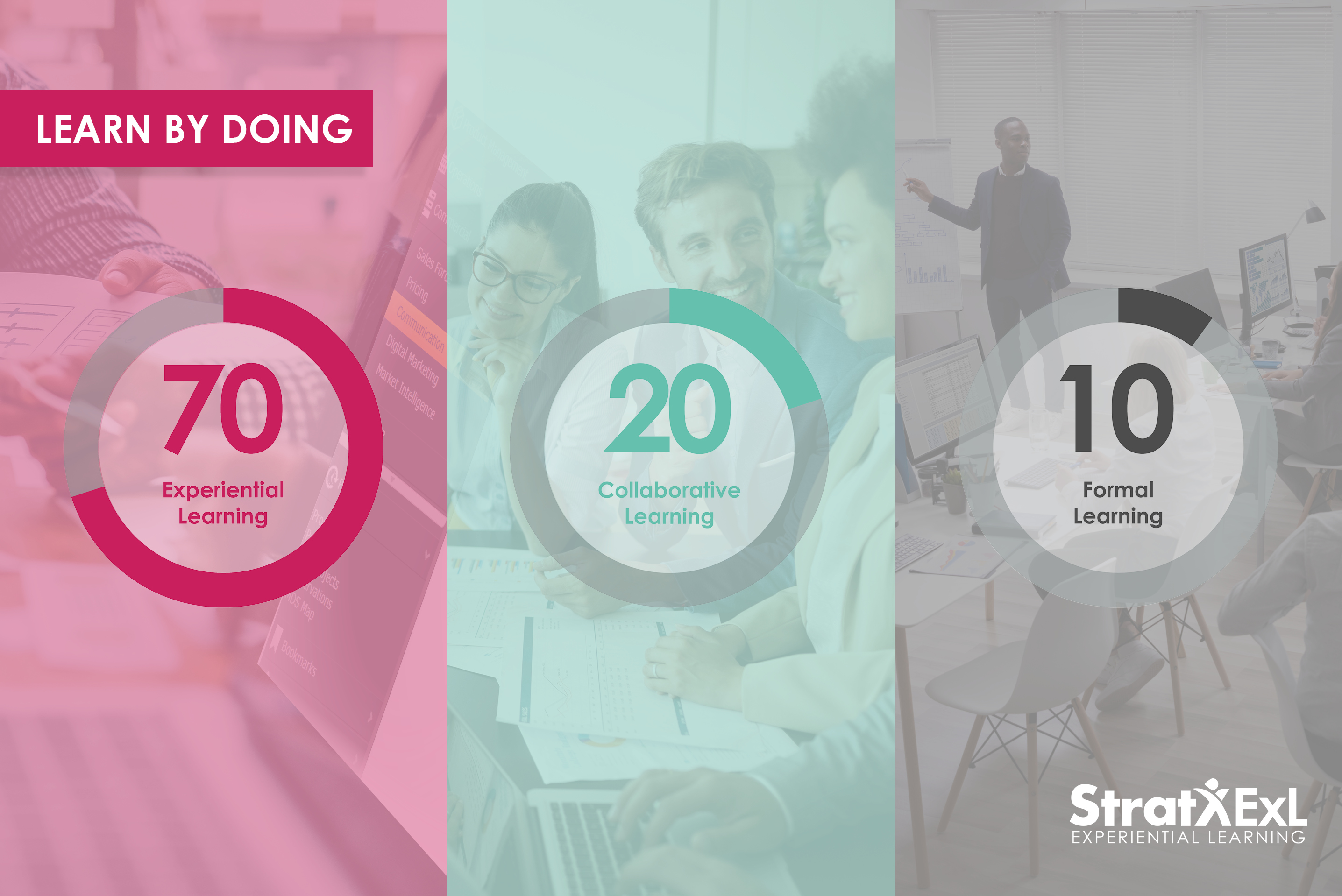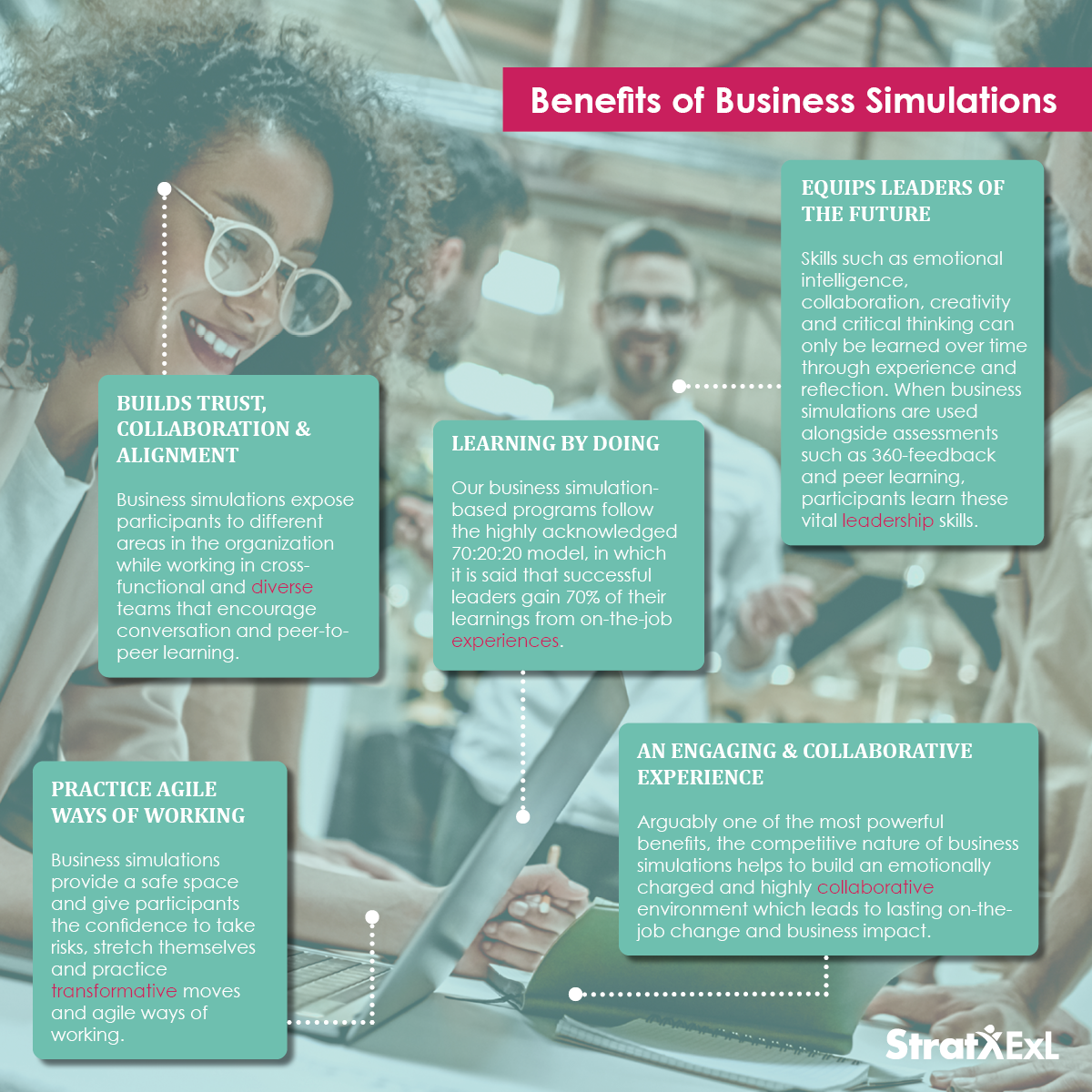Experiential Learning
Corporate Learning & Development with StratX ExL

Experiential Learning fosters better learner engagement by providing a memorable, collaborative, and safe space to practice, experiment, problem-solve, and develop new skills and behaviors necessary for the needs of today’s volatile business world.
This page will cover the core essentials of experiential learning, the impact of using experiential learning for your corporate learning needs, and why StratX ExL is the chosen partner for turnkey experiential learning solutions.
This page will cover:

What is Experiential Learning?
Experiential learning is simply put, learning by doing.
Instead of passively being exposed to a topic or a skill through lectures or cases studies, experiencing something for oneself allows much greater understanding and retention of the new material, in part through the creation of strong emotional markers associated with the experience.
Today, many of the top Fortune 500 companies use experiential learning to equip their leaders and teams with the necessary skills needed to thrive in the business world.


A Proven Learning Model for Effective Leaders
Studies have shown that the most effective managers learn by following the 70:20:10 model.
- 70% of learnings come from on-the-job experiences
- 20% of learnings come from constructive peer interaction
- 10% of learnings come from traditional training courses and reading
Effective managers acquire most of their learnings by actively experiencing and figuring out concepts themselves which is what makes experiential learning so effective.

Experiential Business Simulations
Experiential learning is practiced through business simulations.
A business simulation is a highly immersive, web-based challenge that puts participants on realistic business scenarios that reflect today’s competitive world. They enable leaders to practice transformative moves and take risks that they’d normally hold back on in the real world. Through business simulations, leaders will acquire years of experience in a matter of days and acquire the skill sets needed to lead in today and tomorrow’s challenging business environment.
Discover more on why business simulations are a powerful learning tool for your learning and development programs.
Experiential Learning FAQs
How does experiential learning compare to traditional learning?
Experiential learning is a hands-on type of training where it helps participants to understand, apply concepts and retain knowledge 90% faster than with traditional learning.
Whether online or face to face, Experiential learning goes beyond simple knowledge transfer as it provides a safe space to develop new behaviors and skills.
What makes experiential learning superior to other learning methods?
Through experiential learning, you create an emotional involvement of participants. As neuroscience teaches us, emotions drive learning retention.
When the learning experience takes the form of a friendly competition via business simulations or serious games, you drive motivation and participants apply themselves in an effort to win.
What skill areas is experiential learning best suited for?
Experiential learning is typically best suited for action-oriented disciplines, especially the ones where the cost of mistakes is high. Examples include learning to fly an aircraft, learning to perform surgery, learning to build a high performing team or learning to manage and grow a business.
For business skills, immersive business simulations are particularly effective. Because simulations compress time and teams can experience years of business decision making in a matter of a few hours. The experience is uniquely suited to develop strategic thinking, as well as critical thinking and business acumen.
How can my organization get the most out of experiential learning?
We all know that people learn from experience and experiential learning helps build deep learning. To make the most of it, we recommend building time for people to reflect on their experience.
For example, an after-action review done in the military gives people a chance to reflect on their experience and identify key learnings.
When using business simulations for leadership development, we give teams a chance to reflect at two levels:
1 - After each round, they debrief with their HR coach to help identify ways to make their team an even higher performing team.
2 - Deeper debrief with the help of a business coach (StratX facilitator), who helps teams reflect on winning moves and areas of improvement.
Besides business simulations, what other experiential learning tools do you use?
We continuously improve our family of learning tools to deliver our experiential learning journeys and work with industry partners to bring the best in-class experience to all.
Our multi-modal toolbox includes on-site seminars, mix of live and recorded webinars, learning expeditions, coaching sessions, collaborative portals, application project work, eLearning modules and remote touchpoints.
How can I implement experiential learning in my corporate training programs?
Designing a learning journey and creating components to deliver a successful experiential learning program is critical.
Taking the time to understand the audience's needs and learning objectives will help decide what key elements to include, how much time is needed for each participant and how to integrate best.
Making sure that there is an application piece is also key - building the application to the real world in the program design will ensure participants are able to bring back learnings on the job and implement where necessary.
"Understanding market dynamics to invest time, energy and money to achieve growth, collaboration and communication between all the functions are critical to success. I learned how to play to win rather play to play."
Business & Growth / Leadership Development Program, 2021
"I can honestly say (that) this has been the most enjoyable course I have ever attended."
Team Dynamics / Remote Leadership Program, 2021
"Getting a chance to interact with peers, learning about the other OpCos, and seeing that our company is truly committed to inclusion. This came across so strongly."
Diversity & Inclusion / Leadership Development Program, 2021

Experiential Learning Success Stories
“The fact that the StratX elements were so immersive and interactive made it much better than any other training.”
For over 35 years, StratX ExL has been an experiential learning partner of choice for many of the top Fortune 500 companies. Discover how we have empowered teams and developed essential skills such as leadership, innovation, and marketing excellence through our experiential learning initiatives.
Choose StratX ExL
Partner with StratX ExL for:
- Proven experiential learning methods that result in improved performance and real business impact
- Personalized experiential learning initiatives that address core business challenges
- Guidance in strategic implementation and focus on business growth, capability building, innovation and diversity
- Expertise in key industries such as BioPharma, B2B, and FMCG; insightful knowledge of trends and effective practices
- Program delivery in customized and scalable blended learning paths that can suit both in-office and remote workforce
- Certified Kirkpatrick professionals, measuring impact through the globally renowned Four Levels® Evaluation
- A diverse team with over 35 years of experience running global learning and development initiatives for leaders and high-performing teams of Fortune 500 companies





